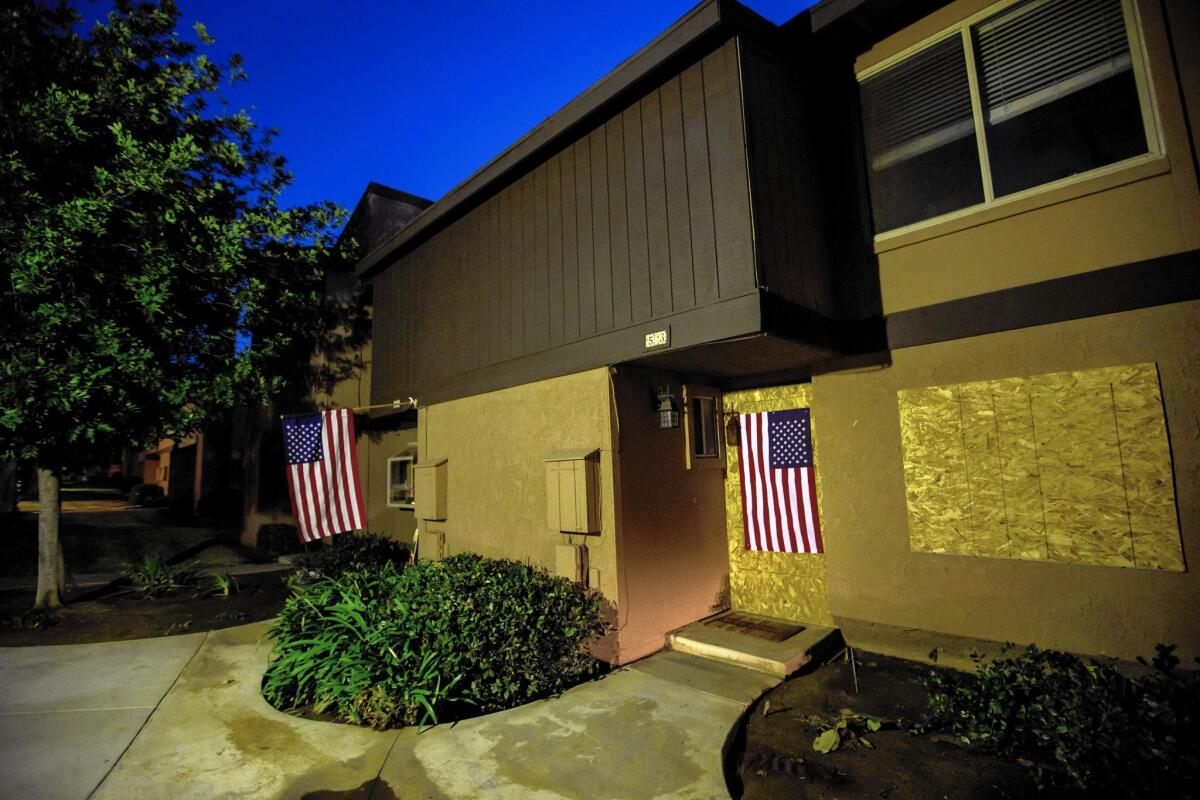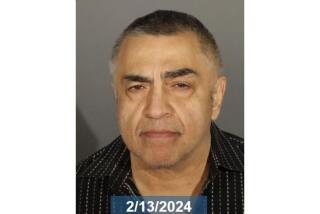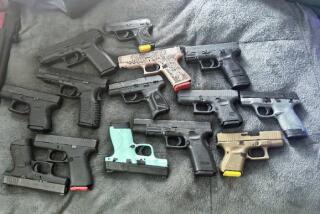Alleged buyer of guns used in San Bernardino shooting may face several charges

Syed Rizwan Farook used to live next door to Enrique Marquez until Farook and his family moved to this Redlands apartment this year.
Enrique Marquez, who allegedly purchased the assault rifles used in the San Bernardino mass shooting, could face a variety of charges, including lying on his application to buy the guns and conspiracy to commit an act of terrorism, legal experts said.
Marquez, 24, legally purchased the rifles from an authorized gun dealer in 2011 and 2012, but there was no record of any transfer of the weapons from him to Syed Rizwan Farook or Farook’s wife, Tashfeen Malik, according to federal sources familiar with the ongoing investigation who spoke on condition of anonymity. Farook and Malik killed 14 people and wounded many others during a Dec. 2 attack on a social services office.
Marquez told officials that Farook asked him to purchase the guns because Farook feared he would not pass a background check, another government source said. That source said Marquez also divulged that Farook was planning a different attack in 2011 or 2012 but later abandoned it.
If Marquez knowingly bought the guns for Farook to use in an earlier attack, he could be charged with conspiracy to commit a terrorist act or conspiracy to commit murder, lawyers said. Either offense carries a potential life sentence.
“I think the guy is definitely facing some serious potential problems,” said UC Hastings law professor Rory Little, a former federal prosecutor. “The idea that he is talking to them without a lawyer makes everybody gasp.”
But Little said it was too early to know the kind of charges Marquez might face. Investigators at this point are probably more focused on obtaining information from Marquez than framing a case against him, the law professor said.
“There are just way too many facts that we don’t know,” Little said. “Nothing is ironclad in the law. The law is a vague and fuzzy art, not a science.”
Ismail Ramsey, another former federal prosecutor, said conspiracy can be charged if a suspect performed an overt act to carry out a crime, even if the crime was never committed. He cited the example of someone buying a ski mask to commit a bank robbery. Purchasing a ski mask is legal but buying it for a bank robbery could support a conspiracy charge, Ramsey said.
“You can withdraw from a conspiracy before completion,” said Ramsey, now a criminal defense lawyer in Berkeley, “and that could be a defense.”
Little said conspiracy could be charged if Marquez knew about a plot that was real and assisted in it, but “not for hot air blown in the back of a barroom.”
“Conspiracy allows you to reach things that didn’t actually happen,” Little said.
To prove someone withdrew from a conspiracy generally requires evidence that the person went to the authorities or prevented the plot from being carried out, he said. “Withdrawal is an incredibly hard defense to make,” he said.
A charge of aiding and abetting is “another way to spread criminal liability to people who are tangentially involved in an offense,” Little said. Investigators would have to prove that Marquez knew the guns would be used in the San Bernardino attack, a charge that law enforcement has not made in either public or private comments.
The most straightforward case against Marquez would probably center on violations of state and federal gun laws, experts said.
Federal rules make it a crime to lie on any part of the registration paperwork required of gun buyers. As part of that law, gun buyers are prohibited from purchasing a gun with the intent of giving it to another person — a deceit known as a straw purchase or “lying and buying.”
The violation, which carries a maximum sentence of 10 years in prison, can be hard to prove, said William Vizzard, who worked for 27 years as an agent in the federal Bureau of Alcohol, Tobacco, Firearms and Explosives.
“The challenge is proving the person’s state of mind. If he confesses that he intended to hand the weapons over, that’s one thing,” said Vizzard, now a criminal justice professor at Cal State Sacramento. “But if he’s at all smart, he’ll deny any intent to pass on the weapons. It’s a pretty impenetrable defense.”
Under California law, transferring the ownership of a firearm from one person to another must be conducted by a registered gun dealer. The dealer keeps possession of the weapon while the person wanting it undergoes a background check by state officials.
Giving or selling a firearm to another without going through such a process is a misdemeanor offense.
Gil Eisenberg, a San Francisco criminal defense lawyer, said Marquez made a “big mistake” by waiving his right to a lawyer.
Eisenberg said Marquez could attempt to have any admissions thrown out on the grounds he was “mentally incapacitated.” Marquez checked himself into a mental health facility after the shooting, “and then shortly after that he was interrogated.”
“Was he competent?” asked Eisenberg. “If he was mentally incapacitated, he might not have understood he could leave.”
Marquez, who could not be reached for comment, has not surfaced publicly since the Dec. 2 attack on the Inland Regional Center. On the weekend after the killings, the FBI searched the home on Tomlinson Avenue where Marquez lived with his parents. Farook used to live next door until he and his family moved to Redlands this year.
Before then, Farook and Marquez were often seen spending long afternoons tinkering on old cars in the driveway of Farook’s home. After Marquez converted to Islam, Farook’s religion, he prayed at a local mosque and married a member of Farook’s extended family, a Russian emigre.
joel.rubin@latimes.com | Twitter: @joelrubin
maura.dolan@latimes.com | Twitter: @mauradolan
MORE ON SAN BERNARDINO
San Bernardino seeks help to pay $1 million in costs from shooting
Tashfeen Malik messaged Facebook friends about her support for jihad
San Bernardino shooting victims: Who they were
More to Read
Sign up for Essential California
The most important California stories and recommendations in your inbox every morning.
You may occasionally receive promotional content from the Los Angeles Times.












